| Famous Diamonds Chart |
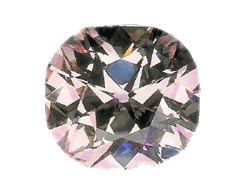 Agra Diamond Agra Diamond
Antique cushion-shaped stellar brilliant, 28 carats (5.6 g).
Color: colorless
Cut Weight(carat): 28.15
Cut: Cushion
Country of origin: India
| Akbar Shah
An Indian diamond which became famous during the days of the Mughal Empire. A diamond with a roughly pear-shaped outline and random faceting, including two Persian inscriptions, the first reading "Shah Akbar, the Grand King, 1028 A.H." (the letters mean Anno Hegirae). The second inscription read "To the Lord of Two Worlds, 1039 A.H. Shah Jehan". The diamond was reportedly part of the original Peacock Throne. Purchased in 1886 in Istanbul by London merchant George Blogg, who re-cut it from 116 carats (23 g) to a pear-shape of 71.70 carats (14.34 g), thus destroying the historic inscriptions. Blogg was the last known owner and the stone's whereabouts are presently unknown.
Color: colorless
Rough Weight(carat): 116
Cut Weight(carat): 71.7
Cut: Pear
Country of origin: India
| 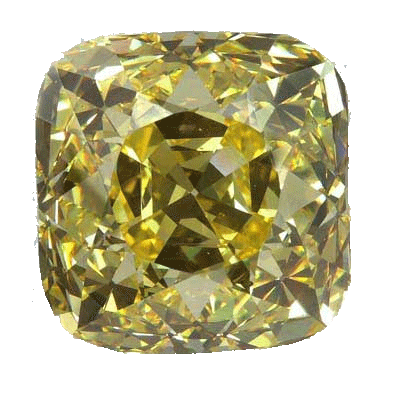 Allnatt Diamond Allnatt Diamond
A 101.29-carat (20.26 g) antique cushion-shaped brilliant fancy vivid yellow diamond.
Color: yellow
Cut Weight(carat): 101.29
Cut: Cushion
Country of origin: probably South Africa
Date discovered: unknown (pre-1950s)
| 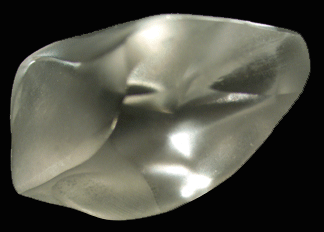 Amarillo Starlight Amarillo Starlight
The largest diamond found by a park visitor in the Crater of Diamonds State Park in Arkansas since 1972, when it was established as a state park. It was found by W. W. Johnson of Amarillo, Texas in 1975 and was a 16.37 carats (3.27 g) white diamond, but it has since been cut into a 7.54 carats (1,510 mg) marquise shape.
Color: colorless
Rough Weight(carat): 16.37
Cut Weight(carat): 7.54
Cut: Marquise
Country of origin: America
Date discovered: 1975
| 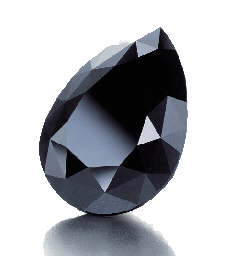 Amsterdam Diamond Amsterdam Diamond
A 33.74 carat (6.748 g) pear-shaped black diamond which sold for $352,000 in 2001.
Color: black
Cut Weight(carat): 33.74
Cut: Pear
Country of origin: South Africa
Date discovered: 1973
| 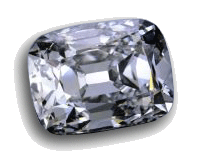 Archduke Joseph Diamond Archduke Joseph Diamond
Antique cushion-shaped brilliant, originally weighing 78.54 carats (15.71 g), purchased by Molina Jewelers of Arizona sometime in the late-1990s and slightly re-cut to 76.45 carats (15.29 g) to improve clarity and symmetry. D color, Internally Flawless.
Color: colorless
Rough Weight(carat): 78.54
Cut Weight(carat): 76.45
Cut: Cushion
Country of origin: probably India
| 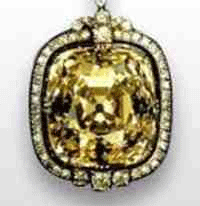 Ashberg Diamond Ashberg Diamond
It is said that this amber-colored, cushion-shaped diamond weighing 102.48 carats, was formerly part of the Russian Crown Jewels. It must have been a late addition to that collection because the stone bears all the characteristics of one from South Africa. In 1934 the Russian Trade Delegation sold the diamond to Mr. Ashberg, a leading Stockholm banker. The Stockholm firm of Bolin, former Crown Jewellers to the Court of St. Petersburg, mounted it as a pendant. In 1949 the Ashberg was displayed, mounted in a necklace containing diamonds and other gemstones, at the Amsterdam Exhibition, the aim of which was to attract new workers to the diamond industry. Ten years later the Bukowski auction house in Stockholm put the Ashberg up for sale but it failed to reach its reserve and was withdraw. Then its owner succeeded in selling the gem to a private buyer whose name was not revealed. Finally, in May, 1981, Christies auctioned the diamond in Geneva where once again it failed to reach its reserve and was withdrawn. Source: Diamonds - Famous, Notable and Unique by GIA and Famous Diamonds by Ian Balfour.
Color: amber
Cut Weight(carat): 102.48
Cut: Cushion
Country of origin: Russia
| 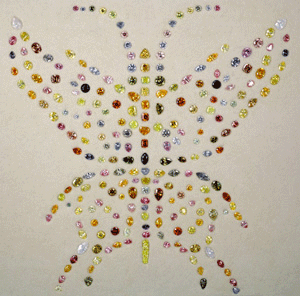 Aurora Butterfly of Peace Aurora Butterfly of Peace
The Aurora Butterfly of Peace diamond collection is an artwork consisting of 240 natural, fancy colored diamonds weighing a combined total of 167 carats (33 g). This butterfly-shaped diamond mosaic was created over a period of twelve years by Alan Bronstein and Harry Rodman.
Color: various
Country of origin: America
| 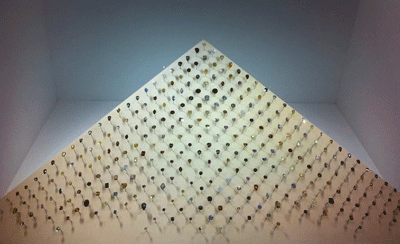 Aurora Pyramid of Hope Aurora Pyramid of Hope
The Aurora Pyramid of Hope is the most comprehensive natural color diamond collection in the world.[1] It was on public display at the American Museum of Natural History in New York from 1989 to 2005 in the Morgan Hall of Gems. Aurora Pyramid of Hope was the centerpiece for the 1998 exhibition The Nature of Diamonds organized by the American Museum of Natural History which toured Japan, Canada and the U.S. In 2005 Aurora Pyramid of Hope was invited to participate in the exhibition Diamonds organized by The Natural History Museum of London. At that time 36 new specimens were added to the original 260 diamonds. Today Aurora Pyramid of Hope consists of 296 diamonds weighing a total of 267.45 carats (53.49 g).
All the colors of the spectrum that diamonds produce are represented in various shapes, saturation and modifiers including blue diamonds, pink diamonds, red diamonds, green diamonds, orange diamonds, purple diamonds, violet diamonds, yellow diamonds, olive diamonds and brown diamonds. Also represented are color changing chameleon diamonds. Aurora Pyramid of Hope was put together by Alan Bronstein and Harry Rodman over 25 years.
Color: various
| 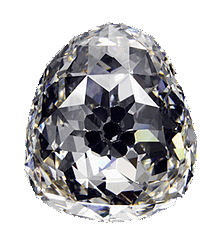 Beau Sancy Beau Sancy
The Beau Sancy is a 34.98-carat (7.00 g) modified "pear double rose cut" diamond that has been owned by a number of European royal houses. In May 2012, it was sold at auction for $9.57 million.
Color: colorless
Cut Weight(carat): 34.98
Cut: Pear
| 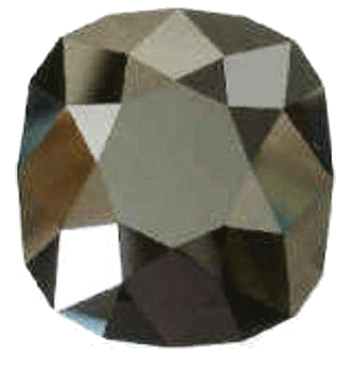 Black Orlov Black Orlov
a 67.50-carat (13.50 g) cushion-cut black diamond, also called the Eye of Brahma Diamond.
Color: black
Cut Weight(carat): 67.5
Cut: Cushion
Country of origin: India
Date discovered: early 19th century
| 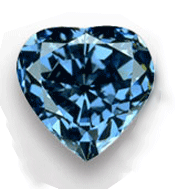 Blue Heart Diamond Blue Heart Diamond
The Blue Heart weighs 30.82 carats and has a rare, deep blue color. The Parisian firm Atanik Ekyanan of Neuilly cut it into a heart shape in 1909 or 1910, and this date raises the issue of whether the rough stone came from Africa or from India. In 1910 Cartier purchased the diamond and sold it to an Argentinean woman named Mrs. Unzue. At the time, it was set in a lily-of-the-valley corsage and remained so until Van Cleef & Arpels bought the gem in 1953. They exhibited it set in a pendant to a necklace valued at $300,000 and sold it to a European titled family. In 1959 Harry Winston acquired the gem, selling it five years later, mounted in a ring, to Marjorie Merriweather Post. Mrs. Post donated the Blue Heart to the Smithsonian Institute in Washington D.C., where it remains to this day.
Color: deep blue
Rough Weight(carat): 103
Cut Weight(carat): 30.82
Cut: Heart
|
|
